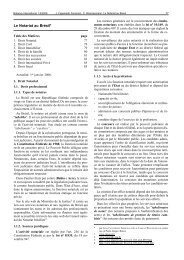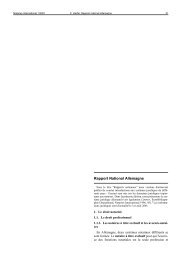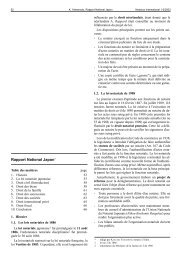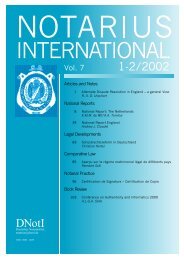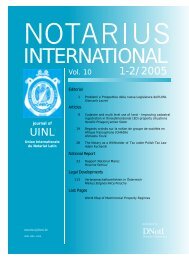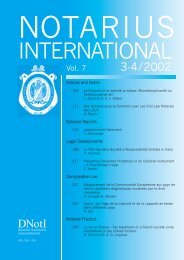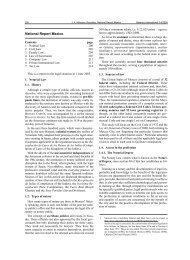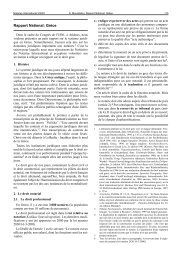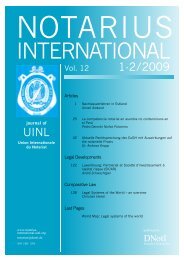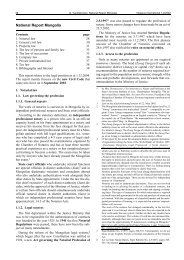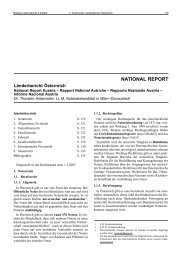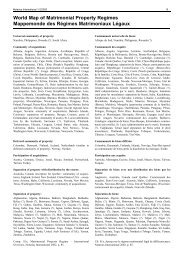You also want an ePaper? Increase the reach of your titles
YUMPU automatically turns print PDFs into web optimized ePapers that Google loves.
152 D. Ockl, Protection of the Purchaser of Immovables to be built in Italy <strong>Notarius</strong> <strong>International</strong> 3-4/<strong>2005</strong><br />
- and the particulars provided for in Article 2826, first indent<br />
of the Civil Code (specific description of the<br />
property with an indication of its nature, of the municipality<br />
in which it is situated, and of the land registry<br />
details; for buildings in course of construction the land<br />
registry details of the land on which they are situated<br />
must be given).<br />
b) exact description of the property and of all appurtenances<br />
for exclsuive use under the contract;<br />
c) the conditions of any mandatory acts and planning<br />
agreements drawn up in order to obtain building permits,<br />
together with a list of the obligations laid down;<br />
d) the technical characteristics of the construction,<br />
with particular reference to the load-bearing structure,<br />
foundations, cementing, floors, roof, and fixtures and fittings;<br />
e) the deadline for completion of construction, with<br />
reference also to the various stages of completion of the<br />
works;<br />
f) indication of the overall price in monetary terms or<br />
the value of any other amount payable, the terms and<br />
methods of payment, specification of the amount of any<br />
sums by way of deposit; the methods of payment of the<br />
price must be by bank credits or direct payments to current<br />
bank or postal accounts indicated by the vendor and<br />
made out to it or in any other form providing evidence of<br />
receipt of payment;<br />
g) the conditions of the guarantee referred to in<br />
Article 2;<br />
h) the existence of any mortgages or charges of any<br />
kind entered against the property with an indication of the<br />
relevant amount, of the person in whose favour and the title<br />
under which they are registered, together with express<br />
mention of the builder’s obligations connected therewith<br />
and an indication of whether those liabilities must be discharged<br />
before or after the definitive sales contract has<br />
been entered into;<br />
i) the conditions of the building permit or of the application<br />
therefor if it has not yet been issued, together<br />
with any other instrument, notice or building approval;<br />
j) the existence of any subcontractors and conditions<br />
in relation thereoto.<br />
6.2 Legally required Annexes<br />
The following shall also be appended to the preliminary<br />
contracts:<br />
a) the specification containing the characteristics of<br />
the materials to be used, set out according to typology,<br />
characteristics and homogeneous values, together with<br />
the list of all the finishings and the accessories agreed between<br />
the parties;<br />
b) the project papers on the basis of which the building<br />
permission was requested or granted, or the most recent<br />
alteration to the original project, comprising the<br />
graphical representation of the properties subject to the<br />
contract, relevant exclusive appurtenances and other<br />
common parts.<br />
6.3 Penalties<br />
However, the legislation does not provide for any<br />
penalty in the event of infringement of its provisions.<br />
Initial commentators have proposed various solutions.<br />
Some maintain that since infringement would concern a<br />
mandatory provision, the consequence must be nullity;<br />
others that infringement gives rise only to an obligation<br />
to renegotiate the contract so as to bring it into line with<br />
legal requirements, subject to the right of the purchaser to<br />
rescind the contract and seek compensation for loss.<br />
Yet others consider that the consequence is merely an obligation<br />
on the part of the builder to provide compensation.<br />
7. Insurance obligation<br />
Article 4 of the decree provides that the builder is<br />
obliged to take out and hand to the purchaser with the<br />
deed of transfer of the property a ten year indemnificatory<br />
insurance policy in favour of the purchaser. That is<br />
to be effective from the date of completion of the works.<br />
It is to cover material and immediate damage to the property,<br />
including third-party liability, which is required under<br />
Article 1669 of the Civil Code, as a result of the total<br />
or partial collapse of the building or serious construction<br />
defects in the works, owing to a defect in the ground or a<br />
construction defect, which manifest themselves subsequently<br />
to the drawing up of the definitive sale and purchase<br />
contract or assignment.<br />
Thus the policy is designed to ensure compensation for<br />
losses consequent upon defects in the property coming<br />
to light after the definitive contract of sale and purchase<br />
or assignment has been entered into.<br />
The legal guarantees under the contract (Article 1667 et<br />
seq. of the Civil Code) extend therefore to all the situations<br />
in which the purchaser takes out a contract intended<br />
to insure subsequent acquisition of title to an immovable<br />
to be built (or other right in rem in it); this means<br />
that it is not possible for all the effects of the negotiated<br />
transaction (or individual parts thereof) to be dealt with<br />
once for all under the contract.<br />
The deadline by which the policy must be drawn up and<br />
delivered to the purchaser is the date of transfer of title.<br />
No formal obligation is laid down as to documentation<br />
of the conditions of the policy or of delivery thereof.<br />
The law lays down no specific penalties in the event of<br />
failure to obtain the policy. It is considered that failure to<br />
obtain the policy gives rise to civil liability on the part of<br />
the builder, affording the purchaser legitimate grounds<br />
for refusing to enter into the definitive contract.<br />
8. Obligation to cancel or fractionalise mortgages<br />
taken out<br />
8.1. Obligation to subdivide real estate financing<br />
By way of an insertion in the single banking code<br />
(Testo Unico Bancario – TUB) 3 , Article 7 of the decree<br />
confers a right to the subdivision of the financing into<br />
shares and, correspondingly of the fractionalising of the<br />
3 contained in legislative decree no 385 of 1 September 1993.



